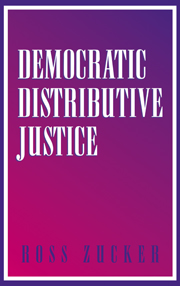Book contents
- Frontmatter
- Contents
- Acknowledgments
- 1 Democracy and Economic Justice
- Part I Unequal Property and Individualism in Liberal Theory
- Part II Egalitarian Property and Justice as Dueness
- Part III Egalitarian Property and the Ethics of Economic Community
- Part IV Democracy and Economic Justice
- Conclusions
- References
- Index
Conclusions
Published online by Cambridge University Press: 02 December 2009
- Frontmatter
- Contents
- Acknowledgments
- 1 Democracy and Economic Justice
- Part I Unequal Property and Individualism in Liberal Theory
- Part II Egalitarian Property and Justice as Dueness
- Part III Egalitarian Property and the Ethics of Economic Community
- Part IV Democracy and Economic Justice
- Conclusions
- References
- Index
Summary
This book specifies a redistributory property right as crucial to the definition of democracy. Two propositions support this conclusion: first, that democracy partly consists in rule in accord with rights, and second, that distributive justice partly consists in a right to equal shares of part of national individual income. The first proposition stands in contrast to a still strong tendency in contemporary thought to disjoin democracy and distributive justice. My analysis shows that democracy can be integrated with distributive justice in accordance with the essential notion of democracy as rule for the people. I demonstrate the second proposition through a theoretical analysis of the ethics of dueness for economic contributions and the ethics of economic community. Ethics of dueness usually leave out concrete forms of equality in individuals' contributions to the creation of economic value. Marx, for example, only considers equalities among individuals' productive contributions. By contrast, I discuss the consumer's role in price determination as a contribution to the creation of value in accordance with the general notion of dueness. In my view, concrete equalities in consumers' economically creative attributes, capacities, and contributions entitle them to an equal share of a part of national income devoted to consumption. With the ethics of economic contributions understood in this way, democracy takes the form of rule in accord with the redistributory property right.
The conclusions of the ethics of dueness for economic contributions are reinforced by the ethics of economic community, which reach a similar view of relative distribution. Analysis of the immanent logic of community shows that membership in a community morally entitles individuals to an equal share of the ends of association.
- Type
- Chapter
- Information
- Democratic Distributive Justice , pp. 301 - 302Publisher: Cambridge University PressPrint publication year: 2000



